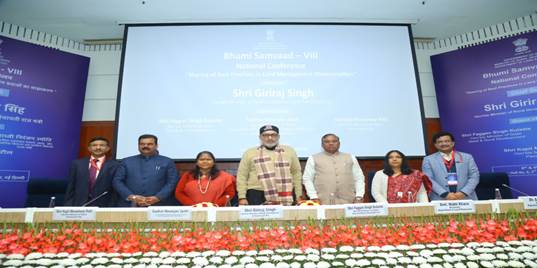
Department of Land Resources organized Bhumi Samvaad VIII: National Conference of State Revenue / Registration Secretaries and Inspector General of Registration (IGR) on “Sharing of Best Practices in Land Management Modernization” during 8th and 9th February, 2024 at Vigyan Bhavan, New Delhi. The conference was inaugurated by Union Minister of Rural Development and Panchayati Raj Shri Giriraj Singh on 8th February, 2024.

The deliberations during the day one of the conference emphasized on a number of actionable points like:
i) Use of block chain, artificial intelligence and machine learning technologies in land governance;
ii) Updation of land records using modern technologies for survey-resurvey prupose;
iii) Impact of digitalization of land records on GDP growth by way of reduction in disputes and litigation related to lands;
iv) Impact of Property Cards issued under the Swamitva scheme on enabling farmers by way of easy access to credit;
v) Achieving the objective of One Nation – One Registration by implementation of National Generic Document Registration System (NGDRS);
vi) Facilitating the provisions of auto-mutation for undisputed transactions of property registration.
The first day of conference saw enriching deliberations with huge amount of enthusiasm shown by the participants in showcasing and sharing their best practices in six sessions covering various subjects on modernization of land management including Land Records Digitization and its Impact on reduction in processes, time, cost, visits to offices, revenue court litigations and Ease of Living etc. in land related services; Bhu-Aadhar or ULPIN Generation – Best practices for generating and maintaining Bhu-Aadhar or ULPIN databases; Auto Mutation in Land Management- Advancements and Applications; Impact of digitisation of land records and computerisation of registration in reduction of litigation; Use of Digitisation of Land Records for Credit access.
Second day of the conference was dedicated to discussion on the theme of Anytime, Anywhere registration. Secretary, Department of Land Resources, Ministry of Rural Development Smt. Nidhi Khare, setting the tone for the second day of deliberations highlighted the importance of such deliberations to enhance cross learning as different States are at different stages of land management modernization process. She emphasized four point agenda for discussion on land management modernization namely i) Process Streamlining and simplification of both language and formats; ii) Legal Reforms; iii) Use of Technologies; and iv) Documentation of Best Practices & Third Party Impact Studies. She further mentioned that there is a need to assess the impact of various initiatives already taken in this field and their proper documentation to enable Pan India level scalability of such initiatives leading to tangible reforms weeding out redundant practices thereby reducing complainant burden.
The second day of Conference saw enriching deliberations in a number of sessions including:
i) Session on Amendments in Registration Act, 1908 with presentations by UIDAI and State representatives from Uttar Pradesh, Jammu & Kashmir, Karnataka and Bihar on major amendments done/under consideration by State Governments that have benefited Government/Citizens and amendments that are to be done to promote ease of living for citizens.
ii) Session on best practices in Regulatory Compliance included presentation by States of Kerala, Andhra Pradesh, Jammu & Kashmir, Madhya Pradesh, Karnataka, Gujarat and SDU NIC Pune on best practices in anytime, anywhere registration and SOP on acceptance or refusal to register a deed/document.
iii) Session on B-Ready Framework had presentation by DPIIT, New Delhi and State of Assam on relevance of questions in B-ready framework of the World Bank in Indian context and preparation for responding and improving ranking in the B-Ready Framework.
About 200 delegates consisting of Officers from Revenue and Registration Departments and IGR of the State Governments/ UTs, representatives from key Central Ministries / Departments and other Stakeholders participated in the two day conference. The Conference saw a diverse group of speakers and participants from various stakeholder groups, including Central as well as State/UT Governments and institutes and facilitated the exchange of knowledge and ideas, showcase innovations, share successful case studies, identify solutions, discuss future strategies, and provide mutual learning opportunities on various topics and potential use across sectors.
*****
SK/SM

